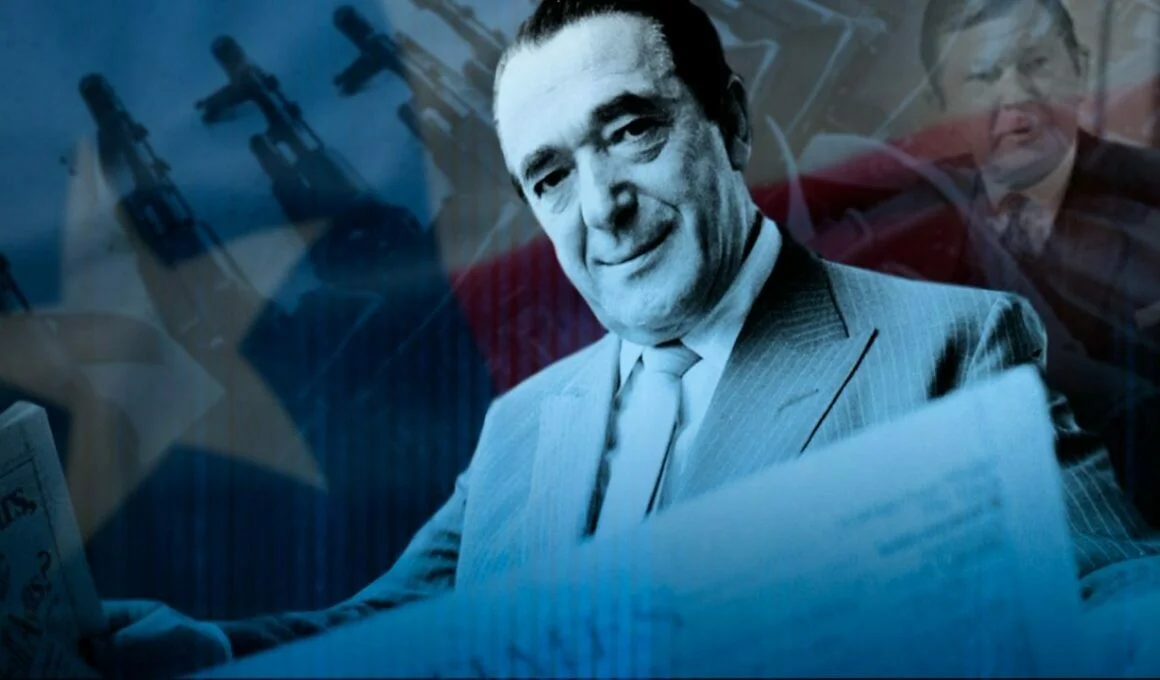by Ed Berger, Unlimited Hangout:

TRUTH LIVES on at https://sgtreport.tv/
When Robert Maxwell’s body plunged into the cold waters of the Atlantic on November 5th, 1991, he left in his wake a seemingly endless parade of unanswered questions about the many lives he had led. In his outward facing persona, he was a giant in the world of media, controlling everything from major publishing houses to newspapers. Towards the end, this facade had crumbled under the weight of revelations that he had systematically looted the pension funds of his employees. This points towards Maxwell’s other life: that of a serial criminal, whose crimes escalated from theft to involvement with a worldwide network of organized crime outfits— with the Russian mafia, the Japanese Yakuza, and Chinese Triads just being some key examples.
There was the life of Robert Maxwell the arms merchant, thanks to the globe-trotting activities of his close business partner, Nick Davies. This life was overshadowed by that of Robert Maxwell the spy, with an espionage career stretching back to jaunts with British intelligence during the Second World War. Work for MI6 seems to have been long-running for Maxwell, but he tirelessly collected fellow—and rival—intelligence agency contacts throughout the years. The most important of these was his connections to the Israeli intelligence apparatus, though he also nurtured ties to American intelligence, and to the Soviet KGB.
This impressive range of contacts saw Maxwell embroiled in the infamous PROMIS affair, a joint CIA-Mossad operation that involved a case management database software, developed by Bill Hamilton and his company Inslaw, which had been stolen by a joint effort involving Israeli spymaster Rafi Eitan and President Ronald Reagan’s Justice Department. One of the versions of PROMIS that was fitted with a “trap door” was weaponized by Systematics, a bank data processing firm owned by Arkansas financier Jackson Stephens, and by figures operating at a weapons development facility located on the Cabazon Indian Reservation in Indio, California. This trap door allowed intelligence agencies to peer into users of PROMIS, and so the software was sold to enemy and ally alike. Maxwell was selected as one of the ‘salesmen’ to peddle PROMIS abroad.
The entire operation advanced along several parallel tracks. Maxwell, working for the Israelis, marketed PROMIS to intelligence agencies and national security installations around the world and within the US, including to Los Alamos and Sandia laboratories. The version of PROMIS marketed by Systematics, meanwhile, was sold to large banking institutions, particularly those in Switzerland. This appears have to be been part of the CIA’s “follow the money” program, which tracked and monitored the financial flows of rival nations.
Against this backdrop there are lesser known, but by no means unimportant, activities that Maxwell engaged in. One of these was his attempted purchase in 1988 of a Texas savings and loan (S&L) institution that became known as Bluebonnet. Since his involvement with the company was brief, sputtering out at about four months of negotiations, it would be tempting to write it off as a footnote in the broader Maxwell story—except for the fact that effectively every person involved in the story of Bluebonnet and its sale was connected, in one way or another, to serious financial crime, arms dealing, and the theft and distribution of the PROMIS software.
Understanding Bluebonnet requires unpacking a tangled and diffuse web of fraudsters, intelligence assets, bankers and real estate developers who together rampaged across Texas and surrounding states during the mid-1980s, bilking and crashing a near-limitless number of thrifts and related lending institutions in a then-unprecedented spree of brazen financial crime. Much of this was exactly what the mainstream narrative of the S&L crisis said it was: runaway greed enabled by deregulatory fever, which allowed crooks to spirit away untold sums. Yet, this isn’t the full picture. In many instances, it seems that money was siphoned off into offshore accounts, where it was then used to help finance covert intelligence operations—support for the Contras of Nicaragua, and for the transfer of arms and sensitive technology to the Middle East.
It also requires understanding Maxwell’s unique relationship to Texas. The state and its long history of political corruption rumbles quietly below the story of Maxwell and many of his most notorious affiliates. Take Jeffrey Epstein, for example. His involvement with the Maxwells likely began with his introduction into the world of arms dealing, forged in large part by his alliance with British arms dealer Douglas Leese. According to Leese’s son, Julian Leese, Epstein reportedly first connected with Leese after meeting him at a party that was hosted by a person described as “a well-known oil baron down in Texas.” Per this account, Epstein had first met Leese’s other son, Nicholas, who then brokered the subsequent introduction between Epstein and his father.
The identity of this “oil baron” remains unknown, but ties made in Texas proved enduring for Epstein. In 1982, Epstein placed—and subsequently stole—hundreds of thousands of dollars from Chicago businessman Michael Stroll, which had been for the ostensible purpose of investing in Texas oil producers. As for his Texas-born relationship with Douglas Leese, arms trafficking wasn’t the only door opened for Epstein. Leese reportedly introduced Epstein to Steven Hoffenberg, who then brought him to work for his company, Towers Financial. In 1993, Towers Financial was unveiled as the operator of a massive Ponzi scheme—though the late Hoffenberg has more recently alleged that Epstein was using the company to wash profits from the lucrative arms trade.
Read More @ UnlimitedHangout.com




